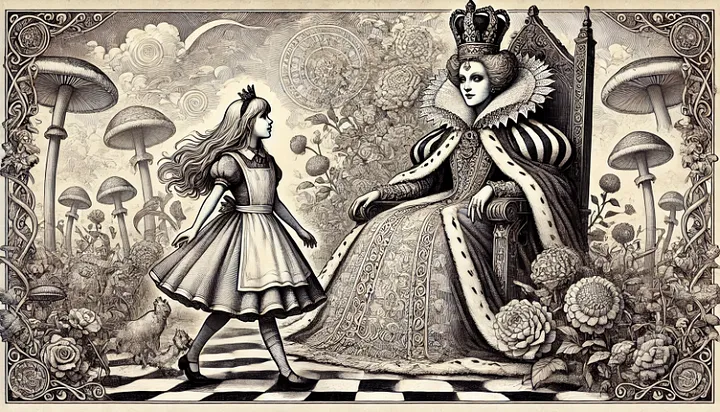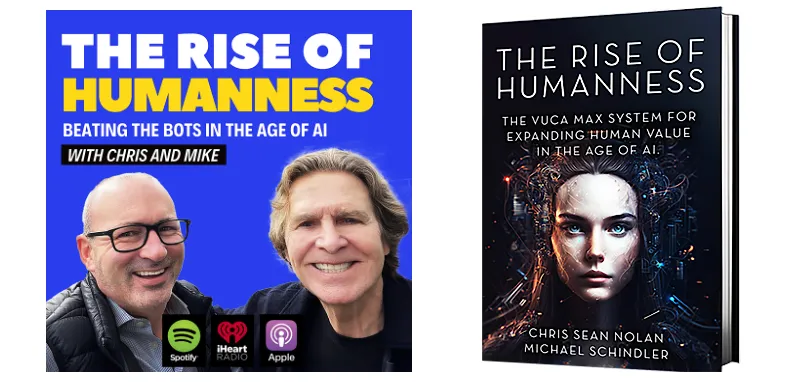WELCOME TO THE RISE OF HUMANNESS IN THE AGE OF AI: PART 3
A Seven Part Series Where We Explore How to Expand Your Human Value and Superpowers in a World Increasingly Run by Machines. How You Not Only Make Yourself Indispensable but Prevail Over the Bots.

“Why, Sometimes I’ve Believed as Many as Six Impossible Things Before Breakfast.” — The White Queen to Alice in Wonderland, Lewis Carroll
Hypothetically, If AI was around in 1903, it would have concluded the odds of two bicycle repair men inventing the airplane were practically zero. Why? Because it would have relied solely on deductive reasoning, analyzing historical patterns, scientific expertise, and the resources available at the time.
AI would have said something like this, “they lack formal education in aerodynamics. They don’t have access to the advanced engineering tools of the day. History shows no successful precedent of such an invention by individuals outside of academia or established institutions.” In short, AI would have dismissed the Wright brothers’ vision as a long shot, an unlikely gamble, and a waste of effort.
In 1952, AI would’ve advised Edmund Hillary and Tenzing Norgay against climbing Mount Everest. The data was clear: frostbite, failure, and death.
Before 1975, it would’ve insisted that breaking the 4-minute mile was a physiological impossibility.
And in 1976, it would’ve rolled its digital eyes at two guys in a garage, telling Steve Jobs and Steve Wozniak that the odds of their homemade computer revolutionizing the world were slim to none.
But history wasn’t made by playing it safe.
AI is brilliant at analyzing data, predicting outcomes, and calculating odds. It thrives in the realm of the known, crafting flawless conclusions from patterns of the past. But it’s reasoning is logical.
Much of human greatness lies in audacity — taking leaps of faith, defying the odds, and trusting in intuition when the numbers don’t add up. Whether it’s breaking records, summiting mountains, or launching revolutions, humans go beyond what is and focus on what could be.

Think Like Sherlock, Dream Like Einstein, and Leap Like Captain Kirk
WE THINK DIFFERENT
Think Like Sherlock, Dream Like Einstein, and Leap Like Captain Kirk: Unlocking Human Superpowers in the Age of AI.
AI is brilliant at pattern recognition, probabilistic generalizations, weighing the odds, analyzing risks, and crunching data to advise on the safest and most probable outcomes.
But here’s the catch: its training and it’s reasoning is locked within the realm of deduction — drawing conclusions from what has already happened. It builds its logic on the deductive problem solving for chain of thought. A bedrock of patterning the past, unable to grasp the audacity of human belief in the impossible
Even AI reasoning engines like OpenAI’s GPT-4 (o1) are primarily designed around deductive reasoning, which is the traditional, step-by-step process of drawing specific conclusions based on general rules or premises. “If all cats have whiskers, and Mittens is a cat, then Mittens has whiskers.”
Like Apple’s “Think Different” marketing campaign exposed: The human story is one of boldly seeing the world not as it is, but as it could be.
It’s a story of people who take risks, question the status quo, and connect dots others overlook. Whether it’s inventing new technology, reimagining industries, or reshaping culture, Apple’s campaign tapped into this universal truth: the most transformative ideas come not from following the rules, but from breaking them and thinking differently.
“Thinking Different” isn’t just marketing — it’s a blueprint for how humans surpass the 80% threshold of AI and lead with uniquely human superpowers of reason.
Let unpack these different reasoning approaches
- Inductive — leaps that pull insights from scattered clues.
- Abductive — hypotheses and reasoning that thrives on incomplete information, like Sherlock Holmes solving crimes with imperfect evidence.
- Free Association — Connecting wild, unexpected dots, much like Einstein’s dream-led E=MC insights or Lewis Carroll’s Alice in Wonderland.
- Human Heuristics — shortcuts for solving problems. In computer science, heuristics are more rules of thumb. Human heuristics are about trusting gut-level instincts, the kind that drive entrepreneurs, athletes, and gamblers to take risks — or Captain Kirk’s famous hunches that override the ship’s computer.
- Common Sense Reasoning— A major weakness of LLMs is applying everyday knowledge about typical situations, since they lack experiential understanding of how the world works. Which is why, they can fail at simple physical reasoning tasks that humans find trivial.
- Divergent — breaking free from conventional patterns to generate unconventional, creative ideas. Think of hackers or criminals finding unexpected solutions or artists redefining their medium.
- Lateral — Coined by innovation pioneer, Edward de Bono, lateral thinking breaks away from established patterns of thinking. It’s about generating unconventional, outside-the-box ideas that break away from traditional patterns, involves disrupting logical processes and random input to uncover surprising solutions.
- Emotional — The Thrill of the Gamble. Think of James Bond at the poker table in Casino Royale. He doesn’t win because of flawless logic — he wins because he reads the subtle tell in his opponent’s behavior, trusting his gut when it matters most
- Exquisite Corpse — Love for unpredictability — Randomized creativity, Breaking free of conventional narrative structures.
- Counterfactual or Causal Reasoning — Exploring “what-if” scenarios that didn’t happen to understand outcome. What if dinosaurs hadn’t gone extinct? Also called
- Analogical Reasoning — As Douglas Hofstadter explains in “Surfaces and Essences,” our ability to connect seemingly unrelated concepts through analogy is the cornerstone of human cognition. This gives us an edge over machines that excel only at narrow, predefined tasks.
Not to mention, many “metaphysical reasoning agents” with unknown origins, fueled by Shamanistic rituals and mind-altering drugs.
CASUAL REASONING: HUMAN SUPERPOWERS
In their article Theory-Based Causal Reasoning: AI and Human Cognition, two Oxford professors lay out many of the ways humans outshine AI. Their research focuses on cognition, decision making, organizational economics and innovation.
The researchers emphasize how human’s think very differently than AI’s data-based prediction models. Human cognition involves a complex interplay of theory, causal reasoning, belief, and experimentation. Humans excel at “Causal Reasoning” and go beyond it. We imagine what-if scenarios — counterfactuals that allow us to see possibilities.
AI Fails Without Data. AI uses a probability-data-based approach to knowledge and is largely backward looking and imitative, whereas human cognition is forward-looking and capable of generating new origins of genuine novelty, new knowledge, and a critical human decision making.
AI Lacks Decision Intelligence: Superior Human Critical Decision-Making capabilities are especially important in times of chaos and uncertainty. The ability to make creative, intuitive leaps and derive meaning and purpose from experience are distinctly human traits.
So, when it comes to thinking, humans don’t just connect dots — we invent them, rearrange them, and sometimes color outside the lines entirely. Which fuels those gut-level hunches that would make Captain Kirk proud.
All of this lays a strong foundation for The Rise of Humanness in the Age of AI and underscores just how powerful our human reasoning superpowers truly are. It’s a reassurance — a reminder of the immense value we bring to the table that no bot can replicate. It’s not just about working with the bots; it’s about knowing when to collaborate with them and, more importantly, when to out-human them.
WHY THIS MATTERS: BETTING ON HUMANNESS IN THE AGE OF AI
AI can’t replicate these reasoning processes — yet. Future reasoning engines may represent the next frontier in AI development.
But many philosophers doubt AI ever will match human reasoning as our reasoning processes rely on factors that go beyond algorithms, such as consciousness or extrasensory perception.
Even future LLM’s are just advancing structured, logical decision-making models that calculate probabilities and patterns, relying on data and logic, not gut feelings or “hunches.” AI can simulate emotional nuances. AI can even simulate randomness, but it still operates deterministically.
Humans thrive on the love of randomness. Stories with surprise twists. Life without unexpected adventures. Stakes that have uncertainty AI’s “randomness” is just another calculation.
AI will never feel the exhilaration of going “all in” on a long shot. Or grasp the concept of courage and risk-taking even in the face of the impossible odds or even fatalistic outcomes.
This blend of all these “out of the box” reasoning types and our emotional intelligence allows humans to excel in ambiguous, high-stakes situations where logic alone falls short.
It’s the leap into the unknown that shapes who we are.
AI is an extraordinary tool, but it’s only as great as the humans who guide it and push the boundaries.
So let AI crunch the numbers and calculate probabilities with precision. Let it assist us. But when it comes to life’s biggest decisions — climbing that mountain, taking that leap, betting on long shots, and daring to imagine the impossible — trust your humanness.
As AI becomes ubiquitous — as it offers instant solutions, automating tasks, and democratizing expertise — the real opportunity lies in doubling down on humanness.
And betting on humanness is not just a strategy — it’s a necessity. Because the greatest wins come from refusing to play by the rules of algorithms and logic.
STAY TUNED FOR “THE RISE OF HUMANNESS” — PART 3

Hooray for Hollaiwood
Next up: AI goes Hollywood: Plot twists, Drama, and Method Acting
The curtain is rising — are you ready for the next act? Where we explore AI’s wild, dramatic, thespian side. From crafting plot twists to mimicking human emotions, AI’s Hollywood ambitions reveal surprising insights into its capabilities — and its limits.
In our Massively Accelerating, eXponentially changing world, understanding and mastering AI isn’t just an advantage — it’s essential. The better we grasp its strengths and weaknesses, the more we can amplify what makes us uniquely human.
Get ready to tap into your human superpowers and turbo-charge your soft skills to not just work alongside AI but exponentially surpass it and redefine what leadership and humanness mean in this new era.
Stay curious. Stay human. Let’s rise.
JOIN THE PODCAST AND GET THE BOOK:
Tune into our podcast, The Rise of Humanness: Beating the Bots. premiering on Spotify, Apple and YouTube January 15th. Where we explore the huge knowledge gap of exactly how humans will fit into an AI-driven world. Our show is all about turning fear into empowerment, shifting the AI narrative, and spotlighting our uniquely human superpowers — where Human Intelligence (HI) doesn’t just coexist but thrives alongside AI.

The Rise of Humanness: The VUCA MAX System for Expanding Human Value in the Age of AI
ABOUT CHRIS NOLAN, MIKE SCHINDER AND VUCA MAX
Chris Nolan and Mike Schindler are business consultants, content creators, lecturers, futurists and teachers in this Volatile, Uncertain, Complex and Ambiguous (VUCA) world, driven by Massive Accelerating Exponential (MAX) change, technology and AI.
They have consulted for hundreds of organizations, from startups to Fortune 500 companies such as Google and Disney. Their signature VUCA MAX leadership and coaching program, www.itsvucamax.com, has played a pivotal role in educating global audiences, companies, brands and individuals to strengthen their conscious leadership, antifragile resilience, strategic foresight, exponential innovation and courage in the Age of AI.
They are leading voices in understanding how AI and emerging technologies are reshaping our world. Their groundbreaking documentary It’s VUCA: The Secret to Living in the 21st Century featured 17 of the world’s greatest thought leaders. Their film, Look Up Now: The Future of Artificial Intelligence and Humanity features futurists, Gerd Leonhard one the world’s foremost experts in on humanizing AI.
JOIN THE HUMAN AI MOVEMENT
Join our community here: www.itsvucamax.com